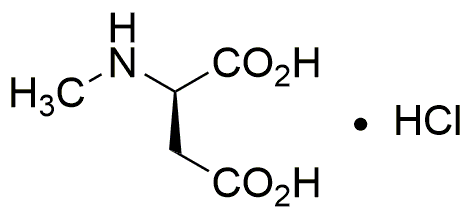N-Methyl-D-aspartic acid hydrochloride is widely utilized in research focused on:
- Neuroscience Research: This compound acts as a potent agonist for NMDA receptors, making it essential for studying synaptic plasticity and neurodegenerative diseases.
- Pharmaceutical Development: It plays a crucial role in developing drugs aimed at treating cognitive disorders, such as Alzheimer's disease, by enhancing neurotransmission.
- Behavioral Studies: Researchers use it to investigate learning and memory processes in animal models, providing insights into human cognitive functions.
- Biochemical Assays: Its ability to modulate glutamatergic signaling makes it valuable in assays that assess neuronal health and function.
- Drug Screening: The compound is used in high-throughput screening to identify potential therapeutic agents targeting NMDA receptors, streamlining the drug discovery process.
General Information
Properties
Safety and Regulations
Applications
N-Methyl-D-aspartic acid hydrochloride is widely utilized in research focused on:
- Neuroscience Research: This compound acts as a potent agonist for NMDA receptors, making it essential for studying synaptic plasticity and neurodegenerative diseases.
- Pharmaceutical Development: It plays a crucial role in developing drugs aimed at treating cognitive disorders, such as Alzheimer's disease, by enhancing neurotransmission.
- Behavioral Studies: Researchers use it to investigate learning and memory processes in animal models, providing insights into human cognitive functions.
- Biochemical Assays: Its ability to modulate glutamatergic signaling makes it valuable in assays that assess neuronal health and function.
- Drug Screening: The compound is used in high-throughput screening to identify potential therapeutic agents targeting NMDA receptors, streamlining the drug discovery process.
Documents
Safety Data Sheets (SDS)
The SDS provides comprehensive safety information on handling, storage, and disposal of the product.
Product Specification (PS)
The PS provides a comprehensive breakdown of the product’s properties, including chemical composition, physical state, purity, and storage requirements. It also details acceptable quality ranges and the product's intended applications.
Certificates of Analysis (COA)
Search for Certificates of Analysis (COA) by entering the products Lot Number. Lot and Batch Numbers can be found on a product’s label following the words ‘Lot’ or ‘Batch’.
Numéro de catalogue
Numéro de lot/série
Certificates Of Origin (COO)
This COO confirms the country where the product was manufactured, and also details the materials and components used in it and whether it is derived from natural, synthetic, or other specific sources. This certificate may be required for customs, trade, and regulatory compliance.
Numéro de catalogue
Numéro de lot/série
Safety Data Sheets (SDS)
The SDS provides comprehensive safety information on handling, storage, and disposal of the product.
DownloadProduct Specification (PS)
The PS provides a comprehensive breakdown of the product’s properties, including chemical composition, physical state, purity, and storage requirements. It also details acceptable quality ranges and the product's intended applications.
DownloadCertificates of Analysis (COA)
Search for Certificates of Analysis (COA) by entering the products Lot Number. Lot and Batch Numbers can be found on a product’s label following the words ‘Lot’ or ‘Batch’.
Numéro de catalogue
Numéro de lot/série
Certificates Of Origin (COO)
This COO confirms the country where the product was manufactured, and also details the materials and components used in it and whether it is derived from natural, synthetic, or other specific sources. This certificate may be required for customs, trade, and regulatory compliance.


